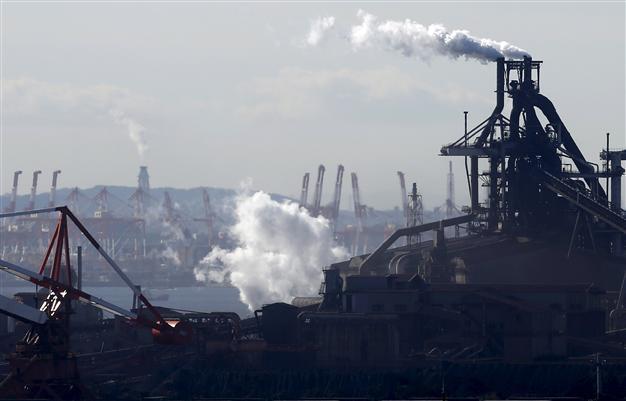Weak climate plans mean world set to overshoot temperature goal: IEA
LONDON - Reuters

Smoke rises from factories at Keihin industrial zone in Kawasaki, south of Tokyo, in this December 16, 2013 file photo. Reuters Photo
Countries’ current pledges for greenhouse gas cuts will fail to achieve a peak in energy-related emissions by 2030 and likely result in a temperature rise of 2.6 degrees Celsius by the end of the century, the International Energy Agency said on June 15.
An international deal to combat climate change is meant to be agreed in December but a meeting in Bonn, Germany, last week ended with little progress towards an agreement to keep average temperature rises within 2C.
The proposed emissions cuts from 2020 offered by governments so far are unlikely to meet the 2C goal, a threshold scientists say is the limit beyond which the world will suffer ever worsening floods, droughts, storms and rising seas.
Based on proposals submitted to the United Nations, and energy policies in countries that have yet to produce plans, the amount of emissions the world can produce if it has a 50 percent chance of keeping to 2C will be exceeded by 2040 - just eight months later than if there were no proposals, the IEA said.
“If stronger action is not forthcoming after 2030, the path ... would be consistent with an average temperature increase of around 2.6C by 2100 and 3.5C after 2200,” it added.
Governments need to set conditions that will achieve an early peak in global energy-related emissions, and review their commitments every five years, the Paris-based IEA said.
Global energy-related emissions could peak by 2020 if energy efficiency is improved; the construction of new coal plants is banned; investment in renewables is increased to $400 billion in 2030 from $270 billion in 2014; methane emissions are reduced and fossil fuel subsidies are phased out by 2030.
“These measures have profound implications for the global energy mix, putting a brake on growth in oil and coal use within the next five years and further boosting renewables,” the agency said.
Under this strategy, the use of coal peaks before 2020 and then declines; oil demand rises to 2020 then levels off and total energy-related greenhouse gas emissions peak around 2020.
Last week, the G-7 leaders pledged to eliminate “inefficient fossil fuel subsidies” but talks on phasing out a form of coal subsidy ended in stalemate as Japan, the biggest user of such aid, led calls for more time.
